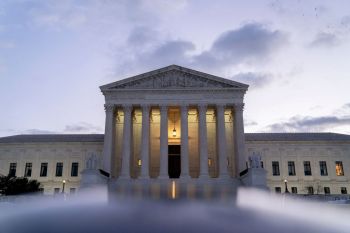Looking deeper at SCOTUS health care decision
Jeff Horwich: In a 5-4 decision — the way the U.S. Supreme Court likes to roll out all big-time decisions lately — the Court has upheld president Obama’s Patient Protection and Affordable Care Act. The key vote in favor came from Chief Justice John Roberts. The U.S. economy that’s been preparing to implement this huge law can carry on — basically.
Marketplace’s David Gura was in court for the decision, and he’s here now to help break it down. And David, the linchpin of all of this is this mandate that all Americans must carry health insurance. By what essential reasoning did the Court say the individual mandate is upheld?
David Gura: The Court was grappling with two Constitutional issues here, Jeff. The government argued that it has the ability to do this because the Constitution gives it the power to regulate interstate commerce. And the second argument the government made was this, and the penalty for not buying health insurance — which is really a pretty small, amount, Jeff — constitutes a tax. The Court said that the government can’t use the commerce clause to back up its position, Jeff, but that tax argument works.
Horwich: And that’s all it takes, apparently. The Court also said states cannot be forced to enforce the mandate by the federal government threatening to withhold their Medicaid money. Have I got that right?
Gura: That’s right, Jeff. So essentially, the Court has said to the states: Look, if you disagree with Medicaid expansion, it’s up to you how you want to proceed. And here they were wrestling with something pretty thorny — the government had said in the law that if states didn’t comply, they could lose some existing Medicaid funding. Today the Court said that would be unconstitutional, but that Congress could decide to withhold future funding if states don’t enforce the mandate, Jeff.
Horwich: Hospital stocks, at least, are rising on the news. Will this generally be greeted as good news by the health care industry?
Gura: I think that the outcome is generally pretty positive for them, generally speaking. Since this mandate stands, Jeff, we’re looking at millions of Americans who are going to get health insurance. And that’s business, of course, for the insurance industry.
Horwich: So, there were a lot of people — and will remain a lot of people — who are opposed to this law. What’s next for those opponents?
Gura: Well, the Court has spoken. And there are plenty of people, as you said, outside the Supreme Court who are angry at what it said.
David Almasi is one of them. He’s with the National Center for Public Policy Research.
David Almasi: I think that the only thing the American people can look to now is across the here at Congress. They’ve pledged repeal, to have a vote on repeal and I don’t think they can do it soon enough.
I should say he was holding a sign that read: Don’t tax me bro. And what he said really sums it up, that this is out of the courts; It’s a political issue now. And today’s decision all but guarantees this is going to be an even more central issue to this election.
Horwich: Marketplace David Gura in Washington. Thank you very much David.
Gura: Thanks Jeff.
There’s a lot happening in the world. Through it all, Marketplace is here for you.
You rely on Marketplace to break down the world’s events and tell you how it affects you in a fact-based, approachable way. We rely on your financial support to keep making that possible.
Your donation today powers the independent journalism that you rely on. For just $5/month, you can help sustain Marketplace so we can keep reporting on the things that matter to you.














